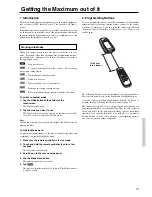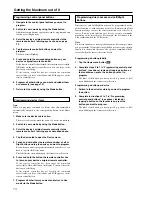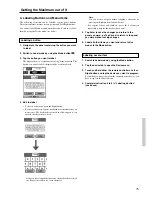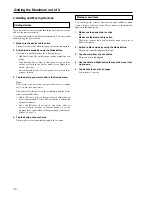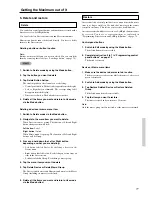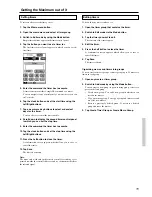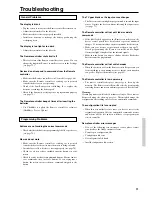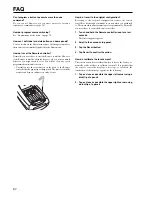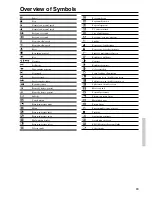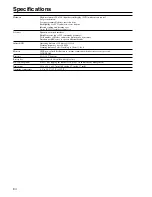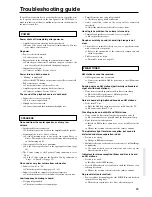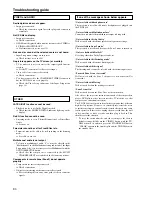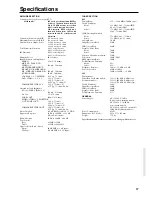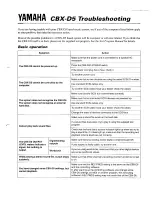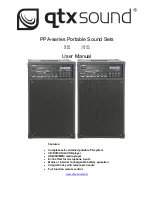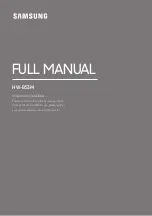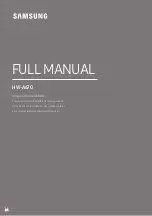
85
FM/AM TUNER
AM stations cannot be received.
• AM loop antenna is not connected.
➞
Connect the included AM loop antenna to the AM antenna
terminals.
Buzzing noise on AM stations (particularly noticeable at
night or with weak stations).
• Noise from electrical apparatus such as fluorescent lamp.
➞
Move the AM loop antenna to different position.
➞
Set up an outdoor AM antenna.
Noise is heard at high-pitched sounds on AM stations.
• Noise from TV set.
➞
Place the AM loop antenna as far as possible from the TV.
➞
Move unit away from TV set.
Crackling noise on both AM and FM stations.
• Noise caused by fluorescent lamp being turned on and off.
➞
Move antenna as far as possible from the fluorescent lamp.
• Noise from automobile ignition.
➞
Install an FM outdoor antenna as far as possible from the
road.
➞
Change the position or direction of the outdoor antenna.
The indicators light for stereo reception, but sound is
distorted and stereo separation is bad.
• Station is too strong.
➞
Change to FM indoor antenna.
• Multiple reflection of the radio waves because of tall buildings
or mountains.
➞
Use antenna that has better directivity and select a point
where distortion is least.
Indicators for stereo reception flicker and hiss is heard
on FM stations.
• Station is too weak.
➞
Install an outdoor FM antenna.
• Stereo FM broadcasts cover only about half the distance of an
ordinary broadcast.
➞
Change the position or direction of the outdoor antenna.
No preset station is recalled.
• Power cord has been unplugged or the POWER switch has been
turned off for a long time.
➞
The memory contents are lost. Store all stations again.
Troubleshooting guide
If a problem occurs while you are using the remote controller, first
try to operate the controls on the front panel of the TX-DS898 to
make sure that it is not due to a malfunction (or worn out batteries) in
the remote controller.
POWER
Power shuts off immediately after power on.
• Amplifier protection circuitry has been activated.
➞
Remove the power cord from outlet immediately. Contact
your Onkyo service center.
No power.
• Power cord is disconnected.
➞
Connect power cord.
• External noise in the affecting the internal microcomputer.
➞
Turn the power button off and then on again or remove the
power cord from the outlet and then plug it in again.
• Internal fuse is blown.
➞
Contact your Onkyo Service Center.
Power turns on but no sound.
• “Muting” is displayed.
➞
Press the MUTE button on the remote controller to turn it off.
• Bad connections or wiring.
➞
Check connections, speaker cables, etc.
• Amplifier protection circuitry has been activated.
➞
Contact your Onkyo Service Center.
The sound of the playback source is not heard.
• Input selector is not set properly.
➞
Set to correct input source.
• Headphones are connected.
➞
Lower volume and then disconnect headphones.
SPEAKERS
No sound from the center speaker, or at very low
volume.
• Speaker cable is not connected.
➞
Check the connection between the amplifier and the speaker.
• Listening mode is set to Stereo or Direct.
➞
Set the Listening mode to any mode other than Stereo or
Direct. The output to the center speaker may differ depending
on the listening mode.
• Center speaker level is set to minimum.
➞
Set the Center speaker level to the appropriate volume (page
34).
• The Center setting of the Speaker Config submenu is set to
“None.”
➞
Set the Center setting at the Speaker Config sub-menu to
“Large” or “Small” (see page 32).
No sound or very low volume from subwoofer.
• Subwoofer is set to “No.”
➞
Check the speaker setting (pages 32, 43).
• Subwoofer speakers output level setting is improper.
➞
Check the output level of the Subwoofer using the test tone.
Low frequency humming is heard.
• Not properly grounded.
➞
Check outer conductor of input plugs.
• Turntable motor is not properly grounded.
➞
Check for proper ground connection.
• Audio connection cables on the rear panel are connected
incorrectly.
➞
Adjust the placement of the cable to reduce hum.
Howling is heard when the volume is turned up.
• Turntable and speakers are located too close together.
➞
Move them farther apart.
Rough or scratchy sound is heard. High range is not
clear.
• The needles of turntable is dirty or worn, or a problem exists
with a connected component.
➞
Refer to the instruction of the connected components and
check for problem.
• Treble control is too high.
➞
Turn treble down (see page 43).



